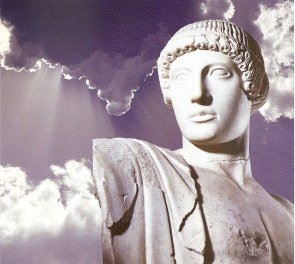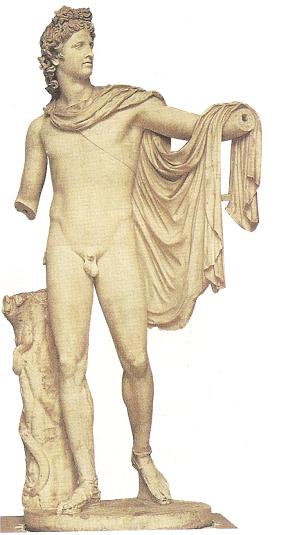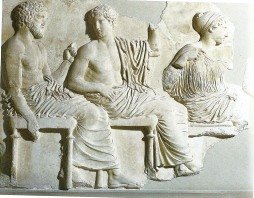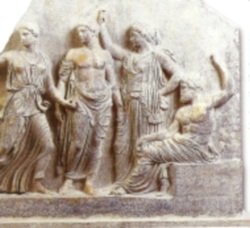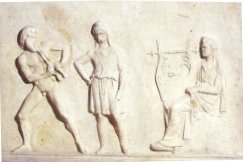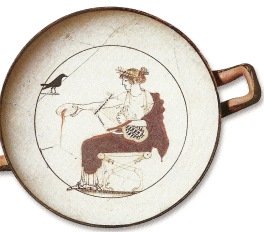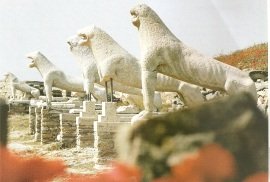Apollo, the most handsome of the Olympians
As the most handsome of all the Olympians, he also personified eternal youth and everything that was associated with youthful vigor and energy. Many scholars consider him to be the most Greek native of all the Olympians, since he is known to belong to an older generation of deities and is not reported to be originated and then imported to Greece from other ancient cults, that existed at the time.
The god serving punishment as a slave The god's relationship with Hercules
The god's birth
There are several myths which recount Apollo's birth. According to the most popular one, Apollo was the son of Zeus and Leto, daughter of the titans Coeus and Phoebe. When Leto was pregnant, Hera, being the jealous wife of Zeus, persecuted the poor girl all over the place. Being aware of her union with the almighty ruler of Olympus, Hera knew that if Leto gave birth to a son, he could ultimately undermine the authority of her own son, Ares. She thus persuaded Gaia not to allow Leto to seek refuge anywhere on Earth. Homer describes in detail all the places where pregnant Leto wandered seeking a place to deliver her child, until Poseidon raised the island of Delos from the sea. But, even then, Hera sought to create more complications for Leto, by preventing the goddess of birth Eileithya to reach her, for nine days. Fortunately, however, with the intervention of the other Olympians who felt pity for poor Leto, she finally managed to give birth to Apollo and Artemis, his twin sister. Apart from Delos, there are other places in Greece, which, according to other myths, claim to be the god's birthplace. These are the island Ortygia, situated near Ephesus in Asia Minor, as well as Tegeira in Boetia and Amphigeneia in Triphylia. In yet another version, Leto changed into a wolf to evade Hera and then sought refuge in Delos to deliver her children. By another account, Leto took her newborn children to a place which was later to be called Lycia (as described a little further down), where she stopped by a spring to bathe. She was chased, however, by local shepherds who, by Zeus's divine intervention, were immediately turned into frogs. Leto, on the other hand, was led by a pack of wolves to the river Xanthus, which she dedicated to her son Apollo. To show her gratitude to the wolves who protected her, she gave the name Lycia (lykos in Greek means wolf) to the land. Encounter with Python
It is mentioned in some of the myths, that, even before she gave birth to the twin gods, Leto had been pursued by the female snake monster Python, who had been sent by none other than her sworn enemy Hera, to kill her. After her mother's narrow escape from the horrible monster,little Apollo (he was only four months old at the time), managed to kill Python using his deadly arrows. The battle took place at the foothills of Mount Parnassus, where the Oracle of Delphi was later founded. Following Python's death, the god of light had to, according to custom, purify himself by going into self-exile for a period of eight years. When he returned to Delphi, he was wearing a laurel wreath. In order to pay tribute to the god of music, the Delphi's inhabitants established the Septeria festival, which was held once every nine years. This included a re-enactment of Apollo's deadly encounter with the monster Python. The god serving punishment as a slave
On two occasions, Apollo was punished, because of murders he committed, to serve time as a slave. On the first occasion, the god killed the sons of the Cyclopes, to punish their fathers for inventing the lightning bolt, which Zeus used to kill the god's son, Asclepius. After committing the murders, the god was punished by his heavenly father Zeus, to become the slave of king of Pherae, Admetus. Apollo was also forced to become the servant and shepherd of the Trojan king Laomedon, because he took part in the gods's revolt against Zeus. Poseidon was punished the same way for the same reason. During their slavery, the two gods were ordered to build the tall walls around Troy. When Laomedon did not keep his promise to pay them the agreed fee upon completing their chore, both gods punished him, each in his own way: Apollo sent the plague to his land, while Poseidon sent a sea monster to terrorize the people and ravage the city.
The god's relationship with HerculesThe best known myth linking the god of music with the mighty hero Hercules , is the one associated with the sacred tripod inside the oracle of Delphi.At one time, Hercules fell sick and thus sought consultation for a cure from Pythia, in priestess in the Oracle of Delphi. The priestess, however, refused to offer her services to the hero. Hercules became angered and left the building, taking with him the sacred tripod, with the intention of using it to found his own oracle. The hero's actions angered Apollo, who rushed to confront him. In order to avert any pending mishappening, their father Zeus managed to separate them, by throwing a lightning bolt between them. The two half-brothers bowed to their father's will and compromised. Hercules then returned the tripod to the temple, where it belonged. Inventor of the flute
According to a myth, the god of music, being true to its name, invented the flute, which he gave to Athena, as a present. The goddess, though, was horrified to see the way that her face was distorted, when she tried to play the instrument. She thus threw it down and cast a curse on it. The "devilish" instrument was picked up by the satyr Marsyas, who, after a lot of practice, managed to become an accomplished player. As a matter of fact, he became so arrogant, as to challenge Apollo to a music contest, claiming that his virtuosity in playing the flute was superior to the virtuosity of the god playing the lyre. For the contest, Midas, the legendary king of Phrygia, and the Muses were appointed to be the judges. The god beat Marsyas, who was severely punished for his arrogance: he was hung and skinned alive by a Scythian slave. As for Midas, who had ruled in favor of the satyr, the god showed him no mercy either: he turned his ears into donkey ears! Amorous Adventures
Considering his incredible good looks and his charm, it is not suprising to know that Apollo boasted the richest collection of lovers, both female or male, among all his fellow olympians (with of course the notable exception of his father Zeus). However, despite his large number of flirtations, he is not considered to be very lucky in his affairs. Some of them, the most well known, are listed below:
The god's Cult
The god's multidimensional entity, as a protector of various facets of everyday ancient Greek life, can be evidenced through the epithets that he had, as well as through the various myths he is associated with. First of all, he was the god of vegetation and agriculture. This is suggested by his epithets Phytalmios, Eriphylos, Enagros, Arotrios etc., as well as the myths linking him to Daphne and Hyacinth, both being plants. Additional evidence is offered by the important Dorian celebration Carneia, which was held in Sparta every four years. Another agricultural celebration in honor of the god as patron of fertile vegetation, was the Pyanopseia, held every Autumn. In the epic poem Iliad, Homer presents Apollo as spreading illness and death in the Greek camp. He is thus presented as the god who can dominate death through illness, but, at the same time, he has the power to cure illness and be a healer. For his capacity as a healer, the god was worshipped in Epidaurus and in Laconia, where he was known as Maleatas and in Elis as Epicourios. Another great power that was attributed to the handsome god, was the power of legislation. As a matter of fact, until the fifth century B.C., greek lawmakers would have their laws ratified by the Oracle of Delphi, while the Spartans believed their laws were a gift from the god to Lycurgus, who was their all time greatest legislator. It is, however, universally accepted that the god's greatest power by far, was the power of divination, that is the power to foretell the future. Oracles dedicated to the god were spread throughout Greece and Asia Minor, the most important being the Oracle at Delphi and then the Oracle at Thebes. The Oracle of Delphi is situated in Phocis in Central Greece, at the foothills of Mount Parnassus. This is the location which, as ancient Greeks believed, was the center, or navel of the earth. As mentioned in the relevant myth, the Oracle was built at the same location that the snake monster Python was slain by the god. According to another version, however, the Oracle was given to the god as a birthday present from the Titan Phoebe, the third deity to rule the sanctuary after Gaia and Themis. The god's prophecies were relayed to the person asking for them, through his high priestess called Pythia - a woman over the age of fifty, who had led a virtuous life.
Return from Apollo to Greek Pantheon
|
||||||||
Resource MaterialClassroom MaterialMovies,DVDs, Games and BooksAbout the SiteYour Stories |
||||||||
|
|
||||||||
